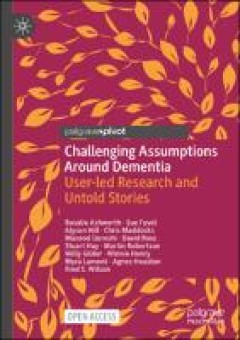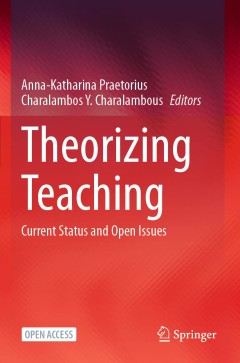Filter by

The Biopsychosocial Model of Health and Disease = New Philosophical and Scien…
This open access book is a systematic update of the philosophical and scientific foundations of the biopsychosocial model of health, disease and healthcare. First proposed by George Engel 40 years ago, the Biopsychosocial Model is much cited in healthcare settings worldwide, but has been increasingly criticised for being vague, lacking in content, and in need of reworking in the light of recent…
- Edition
- 1
- ISBN/ISSN
- 9783030118990
- Collation
- XIII, 149 ill; lamp
- Series Title
- -
- Call Number
- -

Historical and Multidisciplinary Perspectives on Hope
This open access volume makes an important contribution to the ongoing research on hope theory by combining insights from both its long history and its increasing multi-disciplinarity. In the first part, it recognizes the importance of the centuries-old reflection on hope by offering historical perspectives and tracing it back to ancient Greek philosophy. At the same time, it provides novel per…
- Edition
- 1
- ISBN/ISSN
- 9783030464899
- Collation
- XVI, 263 hlm; ill., lamp.,
- Series Title
- -
- Call Number
- -

Challenging Assumptions Around Dementia: User-led Research and Untold Stories
This open access book explores the expectations surrounding dementia, what it ‘looks like’ and how people have been treated by others. It aims to raise awareness of the different types of dementia, and how they impact the brain, body, and lived experience, including experience of Alzheimer’s disease, Vascular Dementia, Posterior Cortical Atrophy, Frontotemporal Dementia, Semantic Dementia…
- Edition
- Ed. 1
- ISBN/ISSN
- 9783031272233, 9783031272226
- Collation
- 146
- Series Title
- -
- Call Number
- 611.8 CHA c

Functional Somatic Symptoms in Children and Adolescents = A Stress-System App…
This open access book sets out the stress-system model for functional somatic symptoms in children and adolescents. The book begins by exploring the initial encounter between the paediatrician, child, and family, moves through the assessment process, including the formulation and the treatment contract, and then describes the various forms of treatment that are designed to settle the child’s …
- Edition
- 1
- ISBN/ISSN
- 9783030461843
- Collation
- XXXI, 383 hlm; ill., lamp.,
- Series Title
- -
- Call Number
- -

Sex Differences in Reading and Math Test Scores of Children = A Heterodoxical…
This open access book examines why reading and math test scores for boys and girls have differed since the origins of testing in the United States. It details the pattern of differences that have remained largely unchanged for more than 100 years in the United States and worldwide. The book explores why boys have modestly larger math test score means than girls, and why girls have far larger re…
- Edition
- 1
- ISBN/ISSN
- 9783031412721
- Collation
- XII, 108 hlm; ill., lamp.,
- Series Title
- -
- Call Number
- -

Gute Kinderschutzverfahren: Tatsachenwissenschaftliche Grundlagen, rechtliche…
In Kinderschutzfällen ist es Aufgabe der Jugendämter und Familiengerichte, im Raum stehende Kindeswohlgefährdungen einzuschätzen und gegebenenfalls durch geeignete Hilfen und Maßnahmen abzuwenden. Diese Einschätzungen und Entscheidungen können den weiteren Lebensweg von Kindern und ihren Eltern stark beeinträchtigen. Umso wichtiger ist es, dass die an familiengerichtlichen Kinderschutzv…
- Edition
- 1
- ISBN/ISSN
- 978-3-662-66900-6
- Collation
- XIV, 664
- Series Title
- -
- Call Number
- -

An Interdependent Approach to Happiness and Well-Being
This open access book examines an interdependent approach to happiness and well-being, one that contrasts starkly with dominant approaches that have originated from Western culture(s). It highlights the diversity of potential pathways towards happiness and well-being globally, and answers calls - voiced in the UN’s Sustainable Development Goals - for more socially and environmentally sustaina…
- Edition
- 1
- ISBN/ISSN
- 9783031262609
- Collation
- XV, 172
- Series Title
- -
- Call Number
- -

Theorizing Teaching
This open access book seeks to create a forum for discussing key questions regarding theories on teaching: Which theories of teaching do we have? What are their attributes? What do they contain? How are they generated? How context-sensitive and content-specific do they need to be? Is it possible or even desirable to develop a comprehensive theory of teaching? The book identifies areas of conver…
- Edition
- 1
- ISBN/ISSN
- 978-3-031-25613-4
- Collation
- XX, 367
- Series Title
- -
- Call Number
- -

P5 eHealth: An Agenda for the Health Technologies of the Future
This open access volume focuses on the development of a P5 eHealth, or better, a methodological resource for developing the health technologies of the future, based on patients’ personal characteristics and needs as the fundamental guidelines for design. It provides practical guidelines and evidence based examples on how to design, implement, use and elevate new technologies for healthcare to…
- Edition
- 1
- ISBN/ISSN
- 9783030279943
- Collation
- XI, 189 hlm; ill., lamp.,
- Series Title
- -
- Call Number
- -
The Psychology of Silicon Valley : Ethical Threats and Emotional Unintelligen…
Misinformation. Job displacement. Information overload. Economic inequality. Digital addiction. The breakdown of democracy, civility, and truth itself. This open access book explores the conscious and unconscious norms, values, and characteristics that drive behaviors within the high-tech capital of the world, Silicon Valley, and the sector it represents. In an era where the reach and influenc…
- Edition
- 1
- ISBN/ISSN
- 9783030273644
- Collation
- VIII, 314 hlm; ill., lamp.,
- Series Title
- -
- Call Number
- -
 Computer Science, Information & General Works
Computer Science, Information & General Works  Philosophy & Psychology
Philosophy & Psychology  Religion
Religion  Social Sciences
Social Sciences  Language
Language  Pure Science
Pure Science  Applied Sciences
Applied Sciences  Art & Recreation
Art & Recreation  Literature
Literature  History & Geography
History & Geography